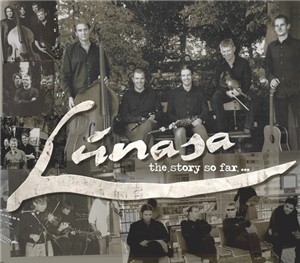 Strange as it may seem from someone who’s been writing about music – at GMR of all places – for several years now, one area in which I am less cognizant than I should be is traditional Celtic music. I have my own childhood memories of often lengthy visits to Grandma’s in the North Carolina hills, which involved a large and intensely musical family, with regular song fests (ironically enough, not a fiddler to be heard in the entire group), which, although subject to other influences over the past three hundred years, still holds a strong attachment to Scots-Irish roots, and some forays into various examples of fiddling from Appalachia and Ireland (as well as Scandinavia, but that’s another story), some early Scottish music, and most recently some music from Wales that more or less defies easy description, but I’ve had little enough exposure that when the editors posted a list of traditional Celtic CDs available for review, I thought “Well, it’s time to expand our horizons a bit.” So I jumped in, as I tend to do.
Strange as it may seem from someone who’s been writing about music – at GMR of all places – for several years now, one area in which I am less cognizant than I should be is traditional Celtic music. I have my own childhood memories of often lengthy visits to Grandma’s in the North Carolina hills, which involved a large and intensely musical family, with regular song fests (ironically enough, not a fiddler to be heard in the entire group), which, although subject to other influences over the past three hundred years, still holds a strong attachment to Scots-Irish roots, and some forays into various examples of fiddling from Appalachia and Ireland (as well as Scandinavia, but that’s another story), some early Scottish music, and most recently some music from Wales that more or less defies easy description, but I’ve had little enough exposure that when the editors posted a list of traditional Celtic CDs available for review, I thought “Well, it’s time to expand our horizons a bit.” So I jumped in, as I tend to do.
As is my habit with new music, I started off by putting Lúnasa’s The Story So Far on the player while going about my daily business, just to tune my ears. My first reaction was, “OK, there’s only so much fiddling I can take at a time.” Then I sat down to listen. It’s a retrospective compilation, and to be perfectly honest, Lúnasa is not at all what I expected. Yes, the fiddle and the pipes fit in with what I know, and the guitar is not unheard of in Celtic music, but the double bass was not something I had looked for, and the sound is, to my ears, unique: Kevin Burke commented that “The words ‘contemporary’ and ‘traditional’ would at first sight appear to be directly in conflict.” As might be expected, I have my own take on that, harking back to my ongoing ruminations about tradition and innovation in musical performance, most simply put as my contention that every musician who is using someone else’s material is negotiating with the past. Lúnasa makes the combination work without the least hint of strain.
It’s easy to be enthusiastic about this collection. Yes, there is solid tradition here, from the haunting, intricate pipes that begin “Eanáir” to the intense fiddling that opens “The Floating Crowbar,” but there is a lot of contemporary sensibility that leads new places, not so much a matter of “hey, look, we’re being modern” as an integral part of the approach – guitar passages that could have come from R.E.M. (“Morning Nightcap”), a hint of Fauré by way of new age, perhaps (“The Miller of Drohan”), a bit of a jazz riff from time to time, never obtrusive, never really calling attention to itself, but undeniably there.
The notes on this collection begin by talking about rhythm and the band’s innovative use of it. Like everything else about this album, it’s not obvious. The bass – well, you don’t consciously notice it. It’s just there, somewhere, providing a motivating force that seems to infuse the whole group. It’s the sort of thing I’m always going on about in novels: the pacing is perfectly apt, transparent, and supremely intelligent. One just flows through this album.
Like any other band, Lúnasa has undergone some changes in the past ten years, but everyone seems to be represented here: Kevin Crawford, whistles; Seán Smyth, fiddle; Cillian Vallely, Uillean pipes; Paul Meehan, guitar; Trevor Hutchinson, bass; Donogh Hennessy, guitar; Mike McGoldrick, flute; and John McSherry, Uillean pipes; with additional support from Tim Edey, guitar; David Odlum, guitar; Dave Hingerty; percussion; and Conor Brady, guitar.
It’s easy to see how Lúnasa has become the force it is in Irish music. I demand from music and musicians that they be doing something interesting and that they do it very well. I have vanishingly small patience with the trite and formulaic, and I’m happy to say that Lúnasa does what I demand: this is music I can get lost in, just following what the musicians are saying, whether it’s their interpretation of traditional tunes or music of their own.
(Compass Records Group, 2008)
